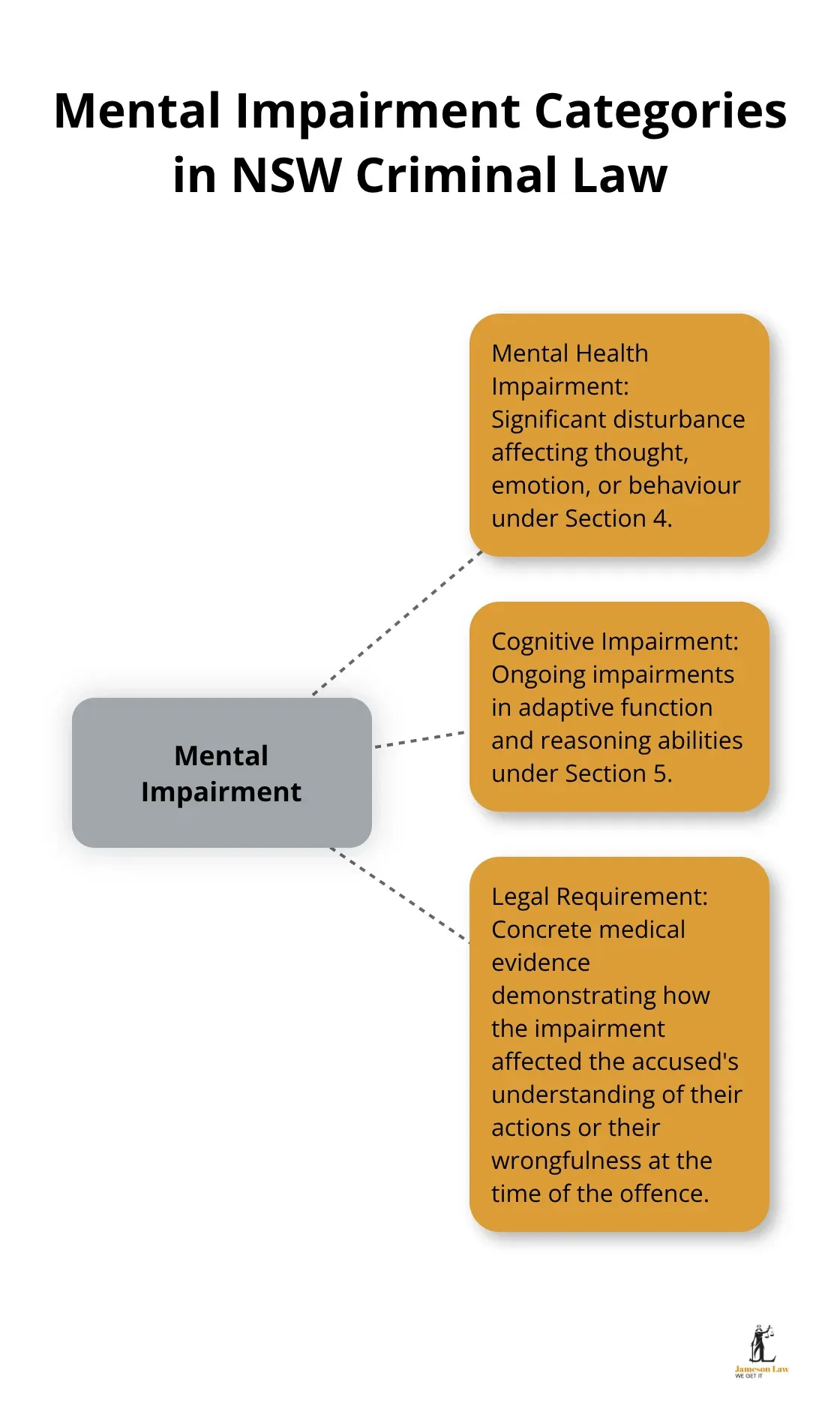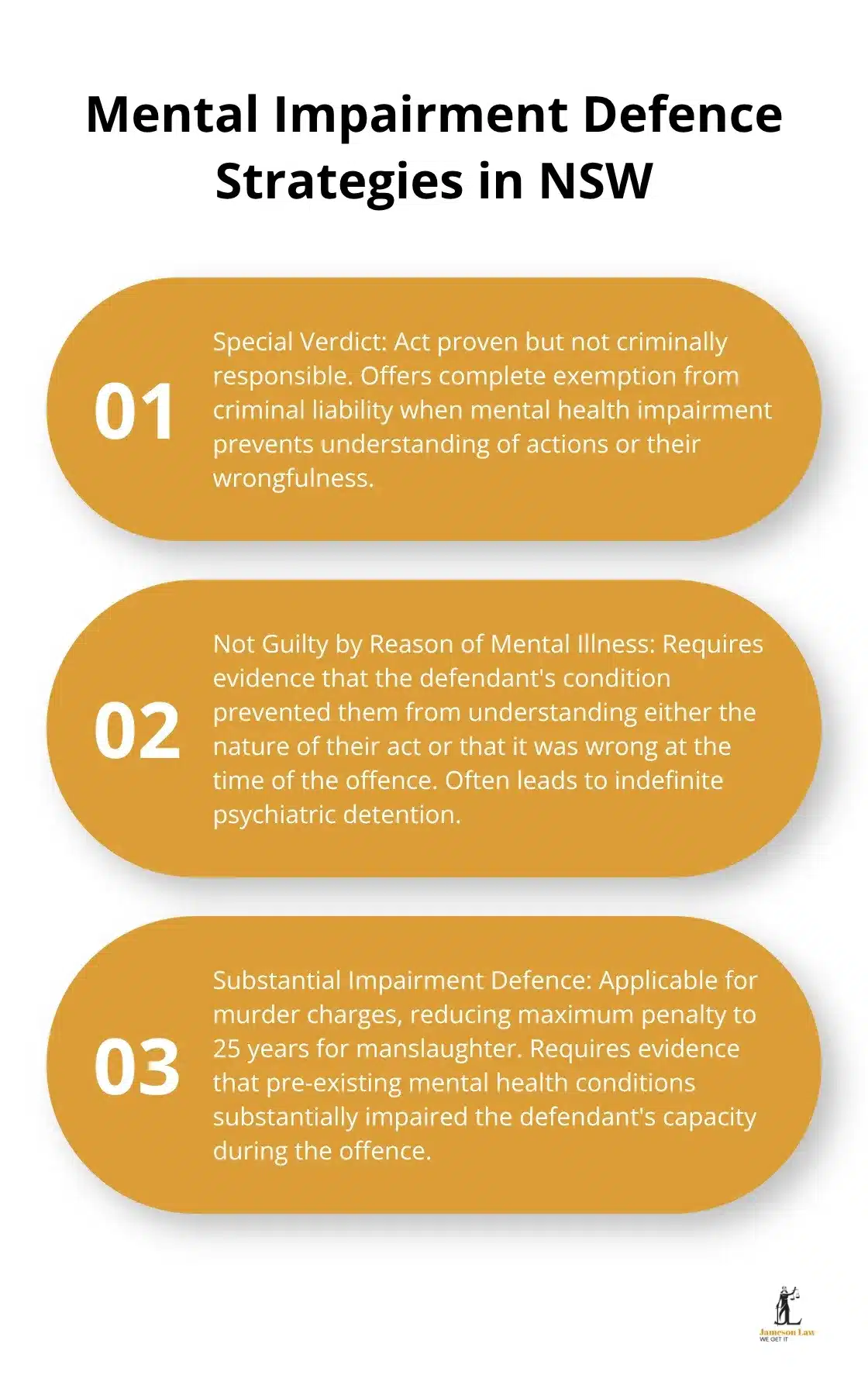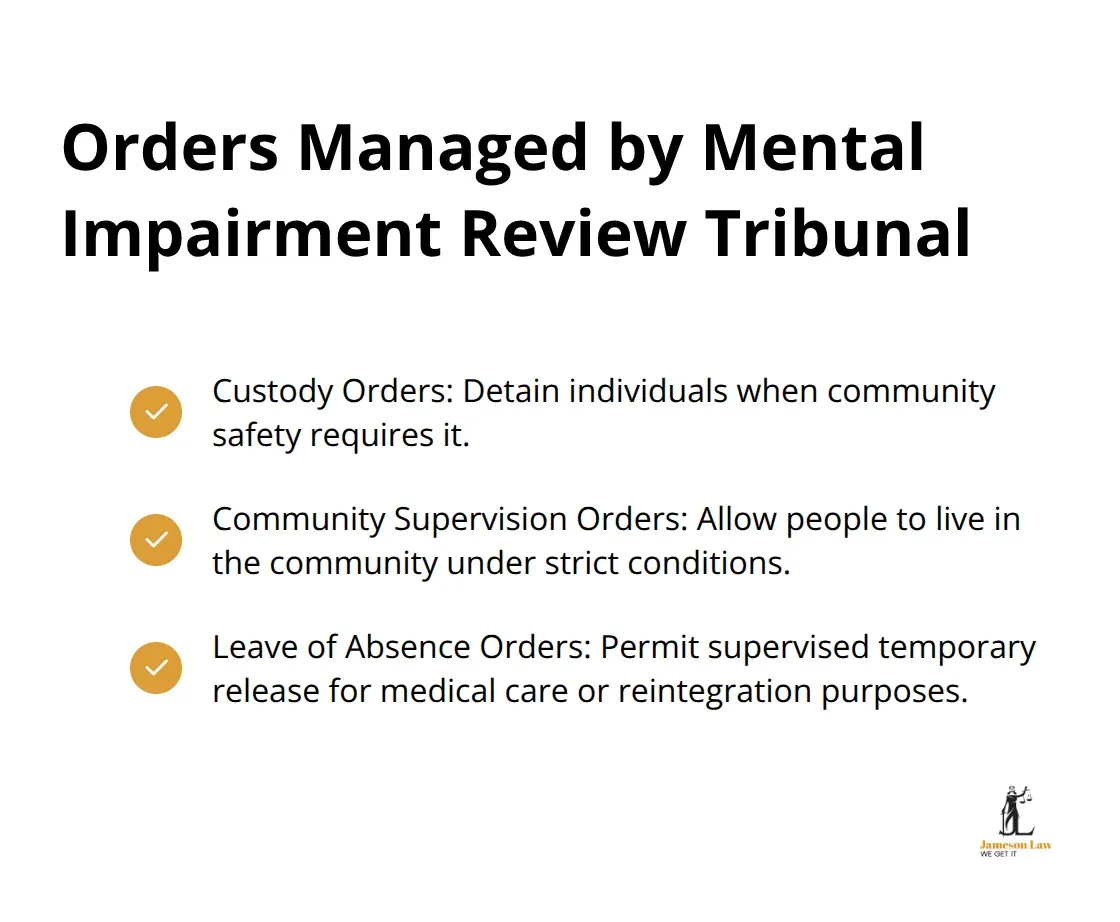Mental impairment defences in NSW criminal cases have become increasingly complex following recent legislative changes. The Criminal Law Mental Impairment Act 2023 introduced significant reforms affecting how courts handle these sensitive matters.
We at Jameson Law see firsthand how these changes impact defendants and their families. Understanding your legal options can make the difference between conviction and appropriate treatment. For immediate guidance, call (02) 8806 0866 or contact our team.
Legal Definition of Mental Impairment in NSW Criminal Law
NSW courts operate under strict statutory definitions when they evaluate mental impairment claims. The Mental Health and Cognitive Impairment Forensic Provisions Act 2020 (NSW) replaced outdated laws and established two distinct categories: mental health impairment and cognitive impairment.
Mental health impairment requires evidence of a significant disturbance that affects thought, emotion, or behaviour under Section 4. Cognitive impairment involves ongoing impairments in adaptive function and reasoning abilities under Section 5. Courts demand concrete medical evidence that demonstrates how the impairment affected the accused’s understanding of their actions or their wrongfulness at the time of the offence. See the Judicial Commission’s bench book on mental illness for context.

Statutory Framework Under the Mental Health Act 2007
The law presumes defendants have no mental health impairment until contrary evidence proves otherwise on the balance of probabilities. This presumption shifts the burden of proof to those who claim impairment exists. The Crown can raise the impairment defence where appropriate. For a general overview of NSW criminal process, see our NSW criminal law guide.
Courts must apply specific legal tests to determine whether impairment meets statutory thresholds. The historic M’Naghten rules significantly influenced current statutory provisions, though modern law has evolved beyond those standards.
Medical Evidence Requirements
While medical evidence is not strictly mandatory, in practice comprehensive psychiatric or psychological evaluations are expected in serious criminal cases. Independent experts should address diagnosis, causation and the accused’s state of mind at the time. Learn how evidence is tested in contested hearings and sentencing.
Expert witnesses must demonstrate that pre-existing conditions substantially influenced the defendant’s ability to comprehend events or control their actions. Opinions should link the impairment directly to the time of the alleged offence.
Court Assessment Process
Judges must explain special verdict implications to juries to prevent bias in decision-making. Streamlined procedures under the Act allow special verdicts by consent where the evidence is clear. For support and information about the tribunal stage, visit the Mental Health Review Tribunal (NSW) and NSW Health mental health services.
Courts increasingly seek independent psychiatric evaluations to inform risk and treatment considerations. These assessments prioritise community safety while balancing treatment needs and individual rights. General assistance is available via LawAccess NSW and Legal Aid NSW.
Mental Impairment as a Defence Strategy
The special verdict of act proven but not criminally responsible offers defendants complete exemption from criminal liability when mental health impairment prevents them from understanding their actions or their wrongfulness. This defence under the NSW forensic provisions requires proof on the balance of probabilities that a significant disturbance affected thought, emotion or behaviour when the offence occurred. See common defences in criminal law.
Defence lawyers sometimes avoid this pathway because it can result in detention and supervision until the Tribunal is satisfied community safety can be managed. Speak with our team about strategy, including bail and case management options.

Not Guilty by Reason of Mental Illness Defence
Courts apply strict criteria to complete mental impairment defences. Medical experts must show the condition prevented understanding of the act or its wrongfulness at the time. Evidence should address diagnosis, symptomatology, and temporal connection to the alleged conduct. Our lawyers can brief appropriate experts and prepare courtroom strategy.
Substantial Impairment Defence for Murder Charges
For murder, substantial impairment can reduce liability to manslaughter where pre-existing conditions substantially impaired understanding or control. This partial defence recognises culpability while acknowledging diminished capacity. It is often more acceptable to courts than a complete mental impairment claim. For sentencing outcomes and advocacy, see our guide.
Fitness to Stand Trial Considerations
Courts must decide fitness to be tried before proceeding where impairment is indicated. The test asks whether the accused can understand the charge, follow the proceedings and instruct their lawyer. Post-finding supervision and support are explained by the NSW MHRT. If police contact you, read our advice on what to do next.
These strategies carry different risks and outcomes. Early advice helps map the best pathway for your health and your legal position.
Court Procedures and Outcomes for Mental Impairment Cases
The Mental Health Review Tribunal (NSW) oversees people found not criminally responsible or unfit to be tried. Orders include custodial care in secure hospitals, supervised community living and structured leave. The Tribunal applies the least restrictive option consistent with public safety. For statistics and reports, see the MHRT’s publications.

Mental Health Review Tribunal Process
In deciding supervision and release, the Tribunal considers risk, treatment needs, compliance, supports and victims’ views. Independent psychiatric opinions are common. Learn how evidence is gathered and tested in our court representation guide and appeals page.
Victim Participation Rights
Victims can file statements that inform release conditions or supervision levels. Information and support are available through NSW justice portals and victim services. The Tribunal may notify registered victims about hearings and decisions.
Treatment Orders and Conditional Release
The current framework offers flexible outcomes that balance care and safety. Conditions can include treatment, accommodation, abstinence and electronic monitoring where appropriate. Community supervision often supports better rehabilitation than long custodial stays. For help navigating complex conditions, contact Jameson Law.
Indefinite Detention vs Treatment Options
Indefinite detention remains possible where safety cannot be managed in the community. However, modern practice prefers calibrated, least-restrictive pathways that protect the public and support recovery. For an overview of recent criminal law updates, see recent changes in criminal law.
Final Thoughts
The Criminal Law (Mental Impairment) reforms have reshaped how NSW courts deal with defendants who live with significant mental conditions. The focus is shifting toward tailored supervision, treatment and rehabilitation while maintaining strong community safeguards.
Outcomes range from special verdicts to supervised release. Choosing the right strategy requires careful assessment of the facts, the medical evidence and long-term implications. For clear, practical advice, speak with our criminal defence team in Sydney. Call (02) 8806 0866 or book a confidential consultation today.













